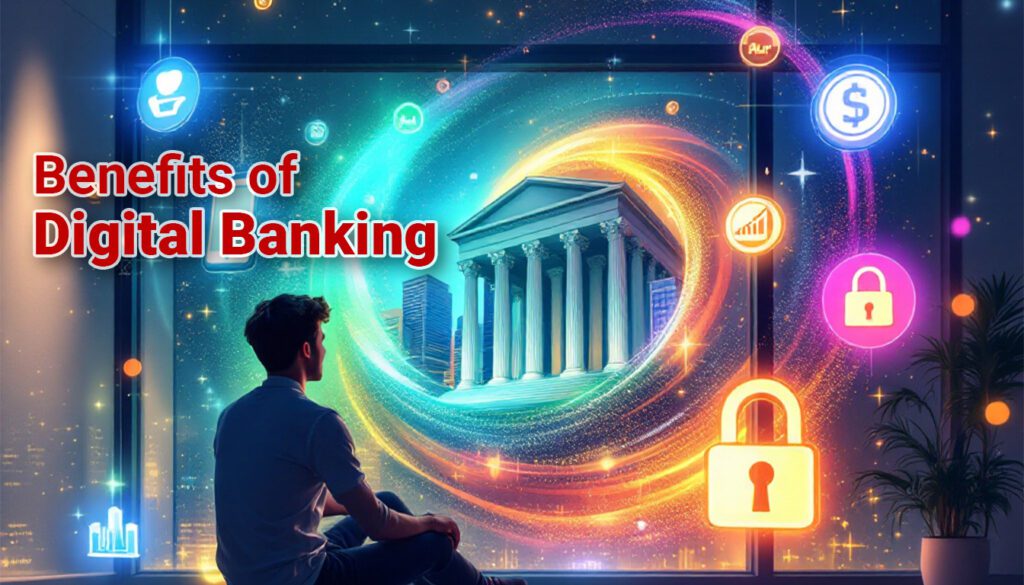In today’s fast-paced world, convenience is key. Digital banking provides that convenience right at our fingertips. No more long waits at the bank. With just a few taps on your device, you can transfer funds, pay bills, and check account balances.

It’s efficient and time-saving. Additionally, digital banking brings enhanced security features. This helps protect your finances from fraud. Plus, it offers real-time updates and notifications. This instantly keeps you informed about your transactions. Digital banking also helps reduce paperwork and environmental impact. Overall, it provides a seamless and modern banking experience. Dive in and explore the benefits of digital banking today.
Convenience And Accessibility
Digital banking brings unparalleled convenience and accessibility to users. It enables people to manage their finances effortlessly. This section explores how digital banking simplifies banking through its 24/7 access and ability to bank from anywhere.
24/7 Access
With digital banking, access your accounts at any time of the day. No need to wait for bank hours. Check your balance, transfer money, or pay bills whenever it suits you. Midnight or early morning, digital banking is always available. This constant availability helps in managing finances efficiently. No more rushing to the bank before it closes.
Banking From Anywhere
Digital banking allows you to bank from any location. On a trip? No worries. Manage your accounts from your smartphone or laptop. Sitting at home? Do your banking without stepping out. This flexibility saves time and effort. Whether at a cafe or on a beach, your bank is always with you. All you need is an internet connection.
Enhanced Security
Digital banking offers enhanced security for your financial transactions. This is one of its biggest advantages. It ensures your money and data are safe from threats. Let’s explore how digital banking provides this security.
Fraud Detection
Digital banking uses advanced fraud detection systems. These systems monitor your account 24/7. They detect unusual activities and alert you immediately. For example, if someone tries to access your account from a different location, you get an alert.
Banks use machine learning and AI to analyze transactions. These technologies can identify patterns and detect fraud faster than humans. This reduces the risk of losing money due to fraud.
Here is a table that shows common fraud detection features:
| Feature | Description |
|---|---|
| Real-time Alerts | Notify you of suspicious activities instantly |
| Behavior Analysis | Monitors your usual spending patterns |
| Two-factor Authentication | Adds an extra layer of security to your account |
Secure Transactions
Digital banking ensures secure transactions. It uses encryption to protect your data. This means your information is turned into a code during transactions. Only authorized parties can read this code.
Banks also use secure sockets layer (SSL) technology. This creates a secure connection between you and the bank’s server. It prevents hackers from intercepting your data.
Here are some key benefits of secure transactions:
- Protects your personal information
- Reduces the risk of identity theft
- Ensures your money goes where you intend
These security measures make digital banking a safe choice for managing your finances.
Cost Savings
Digital banking offers numerous advantages, and one of the most significant is cost savings. By utilizing digital banking, both banks and customers can save money in various ways. This section will explore the key areas where cost savings are most evident.
Lower Fees
Traditional banks often charge high fees for services. Digital banks, on the other hand, usually have lower fees. Customers can save on account maintenance, overdraft, and transfer fees. These savings add up over time.

Reduced Operational Costs
Digital banking reduces operational costs for banks. There is less need for physical branches. Banks save on rent, utilities, and staffing. These savings can be passed on to customers in the form of lower fees and better rates.
Time Efficiency
Time Efficiency is a crucial benefit of digital banking. In today’s fast-paced world, saving time is essential. Digital banking allows you to manage your finances quickly and easily. This convenience can significantly improve your daily routine.
Instant Transfers
With digital banking, you can make instant transfers anytime. You no longer need to visit a bank branch. You can transfer money with just a few clicks. This feature is very useful for urgent payments.
For example, paying bills or sending money to family members becomes effortless. Digital banking platforms often provide real-time notifications. This helps you keep track of your transactions immediately.
Quick Account Management
Quick account management is another advantage of digital banking. You can check your balance, view transaction history, and more.
Here are some common tasks you can do quickly:
- Monitor account activity
- Set up automatic bill payments
- Update personal information
This level of convenience ensures that you have control over your finances. You can manage your account from the comfort of your home. No more waiting in long lines at the bank.
Personal Financial Management
Digital banking offers many benefits for managing personal finances. One major advantage is easy access to tools and features that help with budgeting and expense tracking. These tools can help users gain better control over their money.
Budgeting Tools
Most digital banking platforms provide built-in budgeting tools. These tools help users create and stick to a budget. Users can set spending limits for different categories like groceries, entertainment, and bills. This helps in understanding where money goes and making informed financial decisions.
Expense Tracking
Expense tracking is another useful feature of digital banking. It allows users to see their spending habits in real-time. By categorizing expenses, users can easily identify areas where they might be overspending. This insight helps in adjusting spending patterns and saving more money.
Innovative Features
Digital banking has transformed how we manage our finances. One of the key aspects of this transformation is the introduction of innovative features. These features make banking easier, faster, and more efficient. Below, we explore some of these groundbreaking features that digital banking offers.
Mobile Check Deposits
Mobile check deposits allow users to deposit checks using their smartphones. It eliminates the need to visit a bank branch. Simply snap a photo of the check with your phone. The funds get deposited into your account quickly. This feature saves time and offers convenience.
Personalized Alerts
Personalized alerts keep you informed about your account activities. You can set alerts for various actions. For example, low balance, large transactions, or upcoming due dates. These alerts help you manage your finances better. They ensure you never miss important updates.
Environmental Benefits
Digital banking has transformed how we manage our finances. One significant impact is its positive environmental benefits. By adopting digital banking, we contribute to a greener planet in several ways.
Paperless Statements
One of the most notable advantages of digital banking is the use of paperless statements. Traditional banking often involves printing and mailing statements, which uses a lot of paper. Digital banking eliminates this need. Customers can now access their statements online, reducing paper waste significantly.
Beyond saving trees, electronic statements are more efficient. They are accessible anytime, anywhere, which means less clutter and more convenience. No more waiting for the mail. Everything is just a click away.
Reduced Carbon Footprint
Digital banking helps in reducing the carbon footprint. Fewer people need to drive to bank branches, which means less vehicle emissions. This simple change can lead to a significant reduction in air pollution.
Another factor is energy consumption. Digital transactions require less energy compared to traditional banking methods. This reduction in energy use further decreases the overall carbon footprint.
Using digital banking methods, we help conserve resources. This small shift in our behavior can make a big difference.
Improved Customer Service
Digital banking has transformed the way customers interact with their banks. Improved customer service is one of the main benefits. Customers now enjoy faster and more efficient support. This has led to higher satisfaction levels.
Chatbots And Ai
Chatbots and AI play a major role in digital banking. These tools provide instant responses to customer queries. They are available 24/7, ensuring help at any time of the day. AI can understand and answer common questions. This reduces the need for human intervention. It makes the process smooth and efficient.
Instant Support
Instant support is a key advantage of digital banking. Customers no longer wait for hours to resolve issues. Queries are handled in real time. This quick response builds trust and loyalty. It also reduces the frustration of waiting. Banks can provide better service with fewer resources.
Frequently Asked Questions
1. What are the benefits of digital banking?
Digital banking offers numerous advantages, such as:
- Convenience: Access your accounts 24/7 from anywhere using a smartphone or computer.
- Time-saving: Perform transactions, pay bills, or check balances instantly without visiting a bank branch.
- Lower costs: Many digital banking services have lower fees compared to traditional banking.
- Enhanced security: Advanced encryption and multi-factor authentication safeguard your transactions.
- Financial management tools: Access budgeting apps, spending insights, and automated savings options.
2. What are 5 benefits of online banking?
Here are five key benefits of online banking:
- 24/7 Availability: Perform transactions and access banking services anytime.
- Faster Transactions: Transfer funds instantly, including international payments.
- Paperless Banking: Manage statements and invoices electronically, reducing paper waste.
- Remote Access: Bank from anywhere, whether at home or while traveling.
- Custom Notifications: Set alerts for low balances, due dates, or suspicious activities.
3. What are the advantages and disadvantages of digital banks?
Digital banks have both pros and cons:
Advantages:
- Cost Efficiency: Lower fees for account maintenance and transactions.
- Ease of Use: User-friendly mobile apps simplify banking tasks.
- Quick Setup: Open accounts and apply for loans without paperwork.
- Tech Innovation: AI tools for personalized banking experiences.
Disadvantages:
- Limited In-person Services: No physical branches for face-to-face assistance.
- Digital Literacy Required: May not be user-friendly for non-tech-savvy individuals.
- Cybersecurity Concerns: Although secure, digital platforms can still be targets for hackers.

4. What are the benefits of digital payments for banks?
Digital payments benefit banks in several ways:
- Cost Reduction: Reduces the need for physical infrastructure and cash handling.
- Efficiency: Faster and more accurate transaction processing.
- Data Insights: Provides valuable data on customer spending habits for personalized services.
- Expanded Reach: Attracts a wider customer base, including unbanked and underbanked individuals.
- Fraud Prevention: Advanced security features and monitoring tools help mitigate fraudulent activities.
5. Is digital banking safe?
Yes, digital banking is generally safe, as most banks use advanced encryption, multi-factor authentication (MFA), and real-time monitoring to protect customer accounts. However, users should follow best practices, such as avoiding public Wi-Fi for transactions and using strong, unique passwords.
6. How does digital banking improve financial management?
Digital banking provides tools like:
- Budget tracking and spending analysis.
- Automated savings options.
- Goal-setting features for financial milestones.
- Instant access to account history and real-time balance updates.
7. Why should businesses switch to digital banking?
Businesses benefit from digital banking by:
- Streamlining payroll and supplier payments.
- Reducing operational costs.
- Accessing business loans with simplified applications.
- Gaining insights into cash flow with real-time analytics.
8. What is the future of digital banking?
The future of digital banking includes AI-driven personalization, blockchain technology for secure transactions, voice-enabled banking, and greater integration with fintech apps for a seamless financial experience.
9. What Is Digital Banking?
Digital banking refers to online and mobile platforms that allow you to manage financial transactions, accounts, and services.
10. How Does Digital Banking Work?
Digital banking works through secure websites and apps, enabling you to perform banking activities from any device on the Internet.
11. What Are The Benefits Of Digital Banking?
Digital banking offers convenience, 24/7 access, faster transactions, and reduced need to visit physical branches.
12. Is Digital Banking Safe?
Yes, digital banking is safe. Banks use advanced encryption and security measures to protect your data and transactions.
Conclusion
Digital banking offers many benefits. It provides convenience and saves time. You can access your accounts anytime, anywhere. Digital banking also offers better security features. It helps you manage your finances easily. No more waiting in long lines. Transactions are faster and more efficient.
Embrace digital banking for a smoother experience. Start enjoying these benefits today.
2 thoughts on “Benefits of Digital Banking: Transforming Your Financial Life”